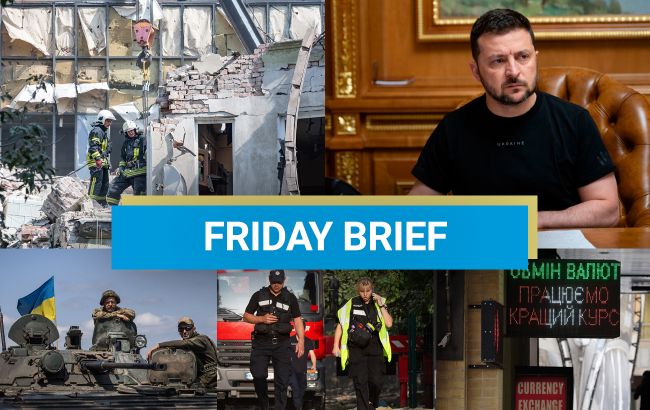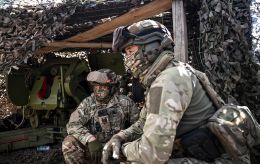NATO operational plan, $50 billion from G7, Putin's ultimatum - Friday brief
 RBC-Ukraine collage
RBC-Ukraine collage
On June 14, NATO approved an operational plan to expand support for Ukraine, and the G7 countries agreed to provide a $50 billion loan by the end of the year. Meanwhile, Russian leader Vladimir Putin named the conditions under which he is supposedly ready for peace talks.
RBC-Ukraine has collected the main news for June 14.
Russia's war against Ukraine: Latest
- Russia reports massive drone attacks in 5 regions and occupied Crimea
- Russia strikes Ukraine overnight: Ukrainian air defense repelling attack
- Ukrainian military reports Russian losses in Kharkiv direction since new offensive began
NATO approves operational plan to expand support for Ukraine
NATO defense ministers have approved an operational plan for enhanced support to Ukraine. It includes a greater role for the Alliance in supplying weapons and training the Ukrainian military.
"On Ukraine, we have agreed on a plan that sets how NATO will lead the coordination of security assistance and training. This will allow NATO leaders to launch this effort at the Washington Summit in July, putting our support for Ukraine on a firmer footing for years to come,” said NATO Secretary General Jens Stoltenberg.
According to him, about 700 troops from NATO and partner countries will be involved in the plan. NATO will oversee the training of the Ukrainian forces at training bases in Allied countries, provide support to Ukraine, coordinate donations of equipment, and contribute to the long-term development of the Ukrainian troops.
“These efforts do not make us a party to the conflict," the Secretary-General said, adding they will enhance support for Ukraine in its right to self-defense.
G7 decides to transfer $50 billion to Ukraine by end of year
The G7 countries will provide Ukraine with a $50 billion loan by the end of the year. It will be repaid using profits from Russian assets.
The leaders of the G7 countries stated that they still aim to dispel the notion that time is on Russia's side and that it will be able to cause Ukraine's economic collapse.
"With a view to supporting Ukraine’s current and future needs in the face of a prolonged defense against Russia, the G7 will launch Extraordinary Revenue Acceleration (ERA) Loans for Ukraine, in order to make available approximately USD 50 billion in additional funding to Ukraine by the end of the year," the communiqué specifies.
The document clarifies that the loan will be repaid using future profits from frozen Russian assets in Western countries.
The G7 leaders also confirmed that Russian assets in their countries will remain frozen until Russia ceases its aggression and compensates Ukraine for the damages inflicted (previously, the EU had to extend the asset freeze annually through separate decisions).
"We intend to disburse this financing through multiple channels that direct the funds to Ukraine’s military, budget, and reconstruction needs – within the constraints of our respective legal systems and administrative requirements," the communiqué emphasizes.
European Union to start accession negotiations with Ukraine in June
The EU ambassadors approved the negotiation framework for Ukraine's EU accession. Negotiations will begin on June 25.
The Belgian presidency of the EU confirmed that ambassadors of the member states supported the framework of negotiations on the EU accession of Ukraine and Moldova.
"The Belgian presidency will call the first intergovernmental conferences on 25 June," the statement said.
Such conferences mean the actual start of the accession negotiations.
Putin wants four of Ukraine's regions
Russian President Vladimir Putin outlined the conditions under which he would supposedly be ready for peace talks with Ukraine.
The Kremlin leader demands that Ukrainian troops withdraw from the Donetsk, Luhansk, Zaporizhzhia, and Kherson regions. Besides, Ukraine needs to abandon its plan to become a NATO member.
Ukrainian President Volodymyr Zelenskyy reacted.
"These messages are ultimatums, they are no different from other ultimatums he has put before. This is a new wave of Nazism, Russian Nazism. He wants us not only to give up part of our temporarily occupied territories but also the unoccupied ones,” the president said.
Without China, but including Saudi Arabia: Participants of Peace Summit in Switzerland
This weekend, Switzerland will host a Global Peace Summit based on the 10-provisions Ukrainian formula. Representatives from around 100 countries and organizations will attend the Summit.
In total, 92 countries will participate in the Summit. 57 countries will be presented at the highest level, such as presidents or prime ministers. 29 countries will be represented at the ministerial level, mainly heads of foreign ministries. Other countries will send ambassadors: India, Indonesia, Israel, the United Arab Emirates, South Africa, the Philippines, as well as Brazil.
According to the list of political guests at the Summit, China will indeed not be represented. This is likely because China has its own perspective on how to achieve an end to the war.
Moreover, earlier reports indicated that Beijing has started promoting its own peace plan and warned countries intending to participate in Switzerland that such meetings would only prolong the war.
However, the list indicates that a representative from Saudi Arabia will attend the Summit, despite not planning to do so earlier. Recently, President Volodymyr Zelenskyy visited Saudi Arabia, which might have influenced the decision for the Saudi Minister of Foreign Affairs, Prince Faisal bin Farhan Al Saud, to attend the Peace Summit.
Another interesting point is the representative from India - the country will be represented by the Indian Ambassador to Russia, Vinay Kumar. Since the beginning of Russia's full-scale invasion of Ukraine, India claimed to have a supposedly neutral position regarding the war.
HIMARS, IRIS-T and armored vehicles: Germany's new aid package to Ukraine
Germany has allocated a new military aid package for Ukraine.
The new aid package includes:
- 10 Leopard 1A1 tanks and ammunition;
- 20 Marder tracked infantry fighting vehicles and ammunition;
- Medium-range IRIS-T SLM air defense system;
- Short-range IRIS-T SLS air defense system;
- Three HIMARS rocket artillery systems;
- Two BEAVER bridge-laying vehicles;
- Two Dachs armored engineering vehicles;
- Bergepanzer 2 armored recovery vehicle;
- Four Wisent 1 demining vehicles with spare parts;
- 16 fuel tankers.
Additionally, Germany will provide ammunition, small arms, and 4 million rounds, demining and explosive ordnance disposal equipment, boats, three AMPS helicopter protection systems, and IT equipment.
Denmark becomes first NATO state to invest in weapons production in Ukraine
Denmark will invest in the manufacturing of Ukrainian weapons. This is the first NATO country to sponsor.
As part of the 23rd meeting of the Ukraine Defense Contact Group, Ukrainian Defense Minister Rustem Umerov met with Danish Defense Minister Troels Lund Poulsen and Dutch Defense Minister Kajsa Ollongren.
Denmark and Ukraine signed a memorandum on the purchase of weapons and equipment from Ukrainian manufacturers.
The two sides also agreed on cooperation between Ukraine and the Netherlands to support the Ukrainian defense industry.

